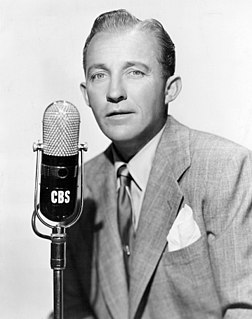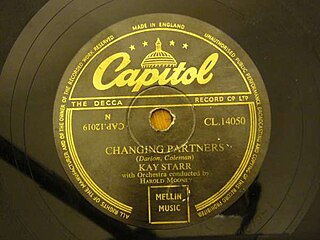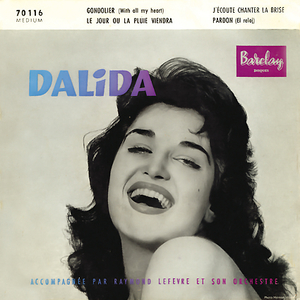"I'll Remember Today" is a popular song.
The music was written by Edith Piaf, the lyrics by William Engvick. First recorded by Piaf, it was later popularized by Patti Page in the United States and by Ruby Murray in the United Kingdom. [1]

William Engvick was an American lyricist, many of whose compositions appear in films.

Clara Ann Fowler, known by her stage name Patti Page, was an American singer of pop and country music. She was the top-charting female vocalist and best-selling female artist of the 1950s, selling over 100 million records during a six-decade long career. She was often introduced as "the Singin' Rage, Miss Patti Page". New York WNEW disc-jockey William B. Williams introduced her as "A Page in my life called Patti".

The United States of America (USA), commonly known as the United States or America, is a country composed of 50 states, a federal district, five major self-governing territories, and various possessions. At 3.8 million square miles, the United States is the world's third or fourth largest country by total area and is slightly smaller than the entire continent of Europe's 3.9 million square miles. With a population of over 327 million people, the U.S. is the third most populous country. The capital is Washington, D.C., and the largest city by population is New York City. Forty-eight states and the capital's federal district are contiguous in North America between Canada and Mexico. The State of Alaska is in the northwest corner of North America, bordered by Canada to the east and across the Bering Strait from Russia to the west. The State of Hawaii is an archipelago in the mid-Pacific Ocean. The U.S. territories are scattered about the Pacific Ocean and the Caribbean Sea, stretching across nine official time zones. The extremely diverse geography, climate, and wildlife of the United States make it one of the world's 17 megadiverse countries.
The recording by Patti Page was released by Mercury Records as catalog number 71189. It first reached the Billboard magazine charts on November 11, 1957. On the Disk Jockey chart, it peaked at #23; on the Best Seller chart, at #31; on the composite chart of the top 100 songs, it reached #32. [2]

Mercury Records is an American record label owned by Universal Music Group. In the United States, it operates through Island Records; in the UK, it is distributed by Virgin EMI Records.
The Billboard charts tabulate the relative weekly popularity of songs and albums in the United States and elsewhere. The results are published in Billboard magazine. Billboard biz, the online extension of the Billboard charts, provides additional weekly charts. There are also Year End charts. The charts may be dedicated to specific genre such as R&B, country or rock, or they may cover all genres. The charts can be ranked according to sales, streams or airplay, and for main song charts such as the Hot 100 song chart, all three pools of data are used to compile the charts. For the Billboard 200 album chart, streams and track sales are included in addition to album sales.




